
1 TRI NGLE THE Columbus North High School • 1400 25th Street, Columbus, IN, 47201 • Volume 102 Issue 8• May 19, 2022
EXECUTIVE BOARD
Ananya Adur
Kaitlyn Ayers
Abinaya Ganesan
Ananya Ramanujapuram
Addy Rogers
INDEPTH EDITOR
Abinaya Ganesan
COPY EDITOR
Alexandra Osburn
SECTION EDITORS
Natalie Brown
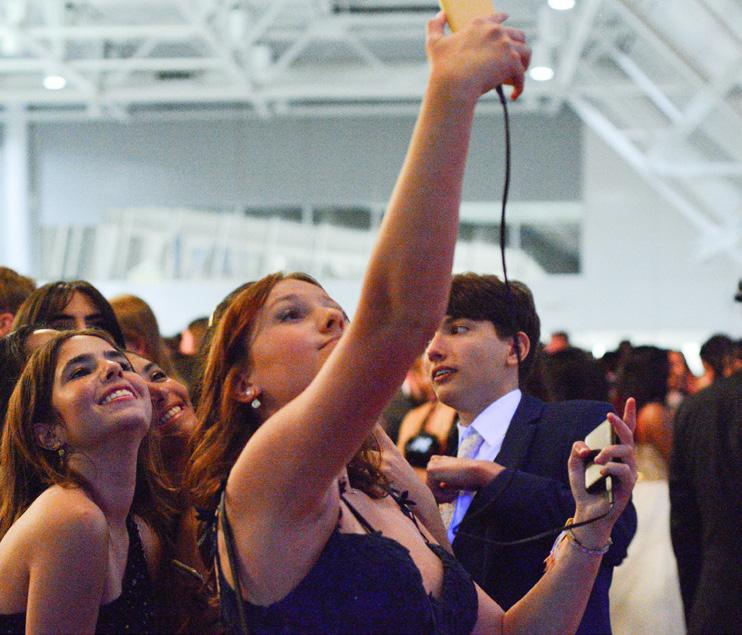
Paula Ramos Perez
INDEPTH TEAM
Alexandra Osburn
Ajay Singireddy
Jasmine Yang
PHOTO EDITORS
Novah Ulm
Grace Wheatley
ART DIRECTOR
Carson Embree
STAFF
Jocelyn Aguilar

Aidan Brown
Irvin Castaneda
Ivy Davidson
Ram Gowda
Abigail Lovins
Izabelle Munn
Meghana Penmathsa
Alice Pisoni
Benjamin Psota

Sylvia Sasse
Abigail Smith
Deshna Venkatachalam
Lydia Weed
ADVISERS
Roth Lovins
Rachel McCarver
Editorial Policy
The Triangle is the designated forum for student expression at Columbus North High School. The student staff chooses all content.
Signed columns published in The Triangle express the writer’s personal opinion and not the views of The Triangle, student body, BCSC, administration, board of trustees or faculty of Columbus North.
The Triangle practices ethical journalism by providing balanced and fair coverage as determined by community standards. The Triangle strives to achieve 100 percent accuracy by checking sources, spelling, and quotes and attaining multiple sources.

The Triangle encourages letters to the editor, but reserves the right to reject them for reasons including but not limited to lack of space, multiple letters of the same topic and personal attacks contained in the letter. The Triangle will not edit for content, but reserves the right to edit for grammar and length. Letters should be submitted to room 1507 or sent via e-mail to administrator@cnhsmedia.com. All Letters much be signed by all persons involved in writing the letter, which the staff will check for validation. A letter sent via e-mail must be validated with a signature from the writer before The Triangle will publish it. If responding to a publication, letters must be turned in within one week of that publication’s distribution.
In the event of death, The Triangle will run a standard obituary. Pertaining to work submitted via social media sites (Facebook, Twitter, etc.), The Triangle will only accept written submissions from the original poster and owner and will only publish entries with the permission of the original poster and owner. The Triangle will not edit submissions for content and reserves the right not to publish them for reasons including but not limited to lack of space, multiple submissions of the same topic, vulgar or incendiary content. The Triangle will not publish photographs from Facebook. Posts on The Triangle’s social media pages by readers are owned by the readers and do not necessarily express the views or opinions of the staff. The Triangle is not responsible for their content and reserves the right to delete and report any inappropriate and unnecessary posts. By posting on The Triangle’s social media pages, the poster grants The Triangle permission to publish the contents of that post. In cases when a source’s information may bring ridicule or incrimination upon himself or herself, the editorial board reserves the right to cite the source as anonymous. The Triangle will never use composite sources and pass them off as anonymous sources.
10 4 9 16


3 THE CYCLE What goes around comes around NEWS INDEPTH 12 4 SPORTS 10 THE MUSIC NEVER RESTS Leaders and members of the Columbus marching band anticipate the upcoming season 11 8 STUDENT LIFE 4 LIGHTS CAMERA ACTION Students at BCSC Prom 2023: A Cinematic Premiere FUN IN THE SUN How students plan to spend their summer vacation 9 5 INDIANA EXPERIENCES WEATHER CHANGES FIRSTHAND Staff describe their experience with the effects of climate change OPINION 7 LIFE IN PLASTIC IS FANTASTIC Everyone’s childhood dream comes true: a real-life Barbie movie 7 A FAREWELL TO GUNN AND THE GUARDIANS A spoiler-free review of James Gunn’s final production for Marvel 7 EXCHANGE EXPERIENCE Exchange students and hosts reflect on their experiences throughout the year 8 FACELIFT FOR THE FIELD How the new renovations to the softball field are affecting players 10 PIECE OF PIE Students and staff perform at American Pie 2023 16 PREVIEW ONLINE Scan with your iPhone camera (Snapchat, too) to be linked to all of CNHS Media's socials.
1 2 3
LIGHTS, CAMERA, ACTION
Students enjoy BCSC Prom 2023: A Cinematic Premiere
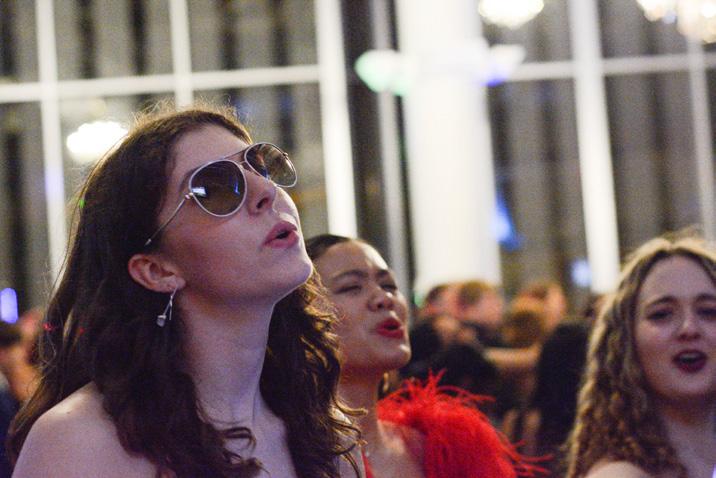

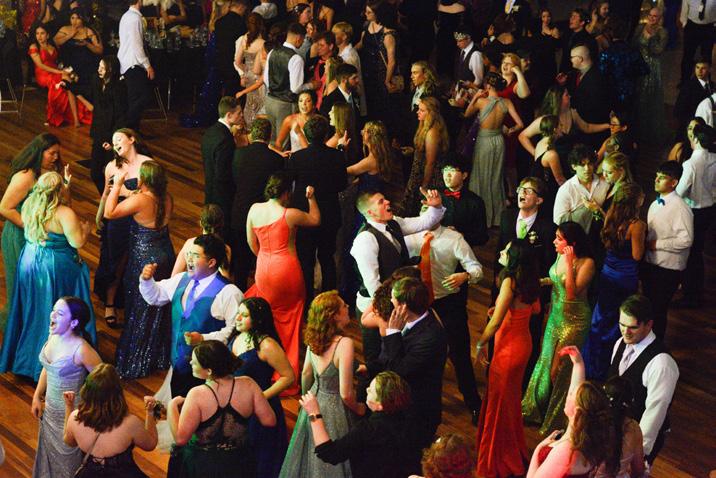
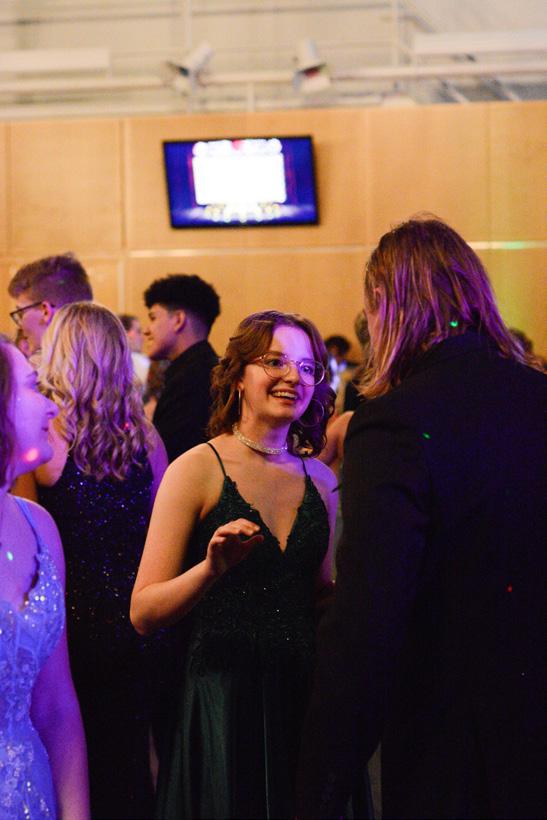
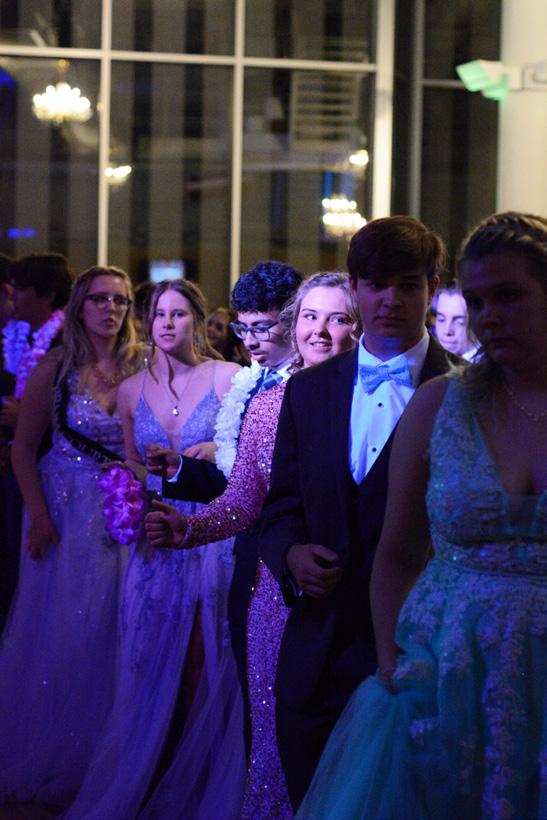
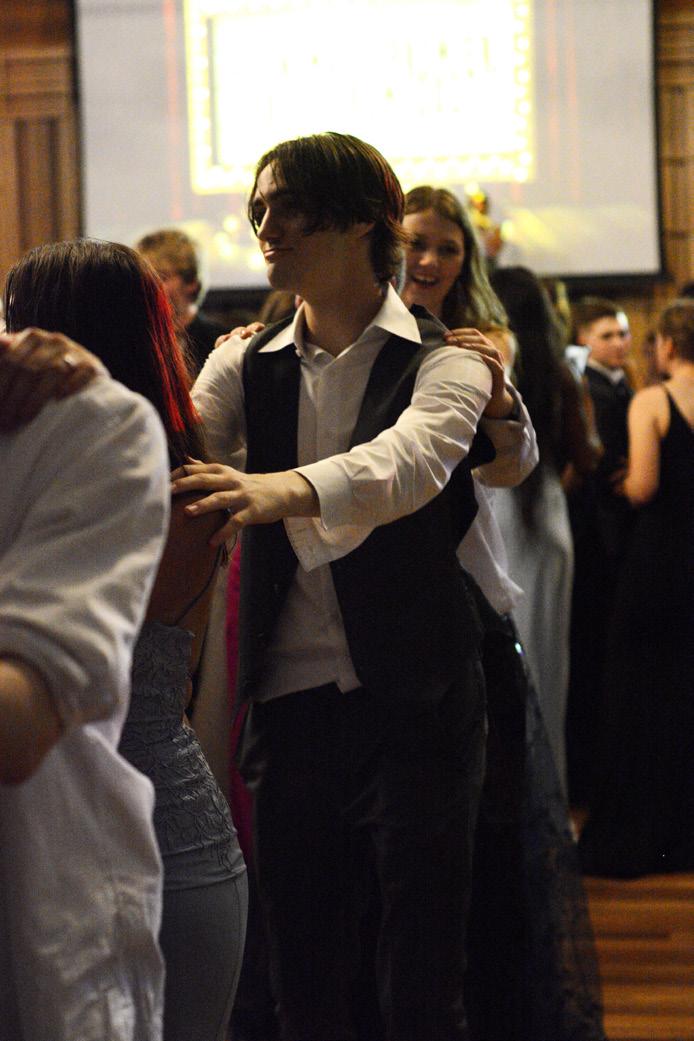
1. Senior Kate Russell sings along to “Dancing Queen” by ABBA
2. A crowd of students dances and sings
3. Students pose for a selfie in their prom attire
4. Senior Riley Schumm reacts after being crowned Prom Queen
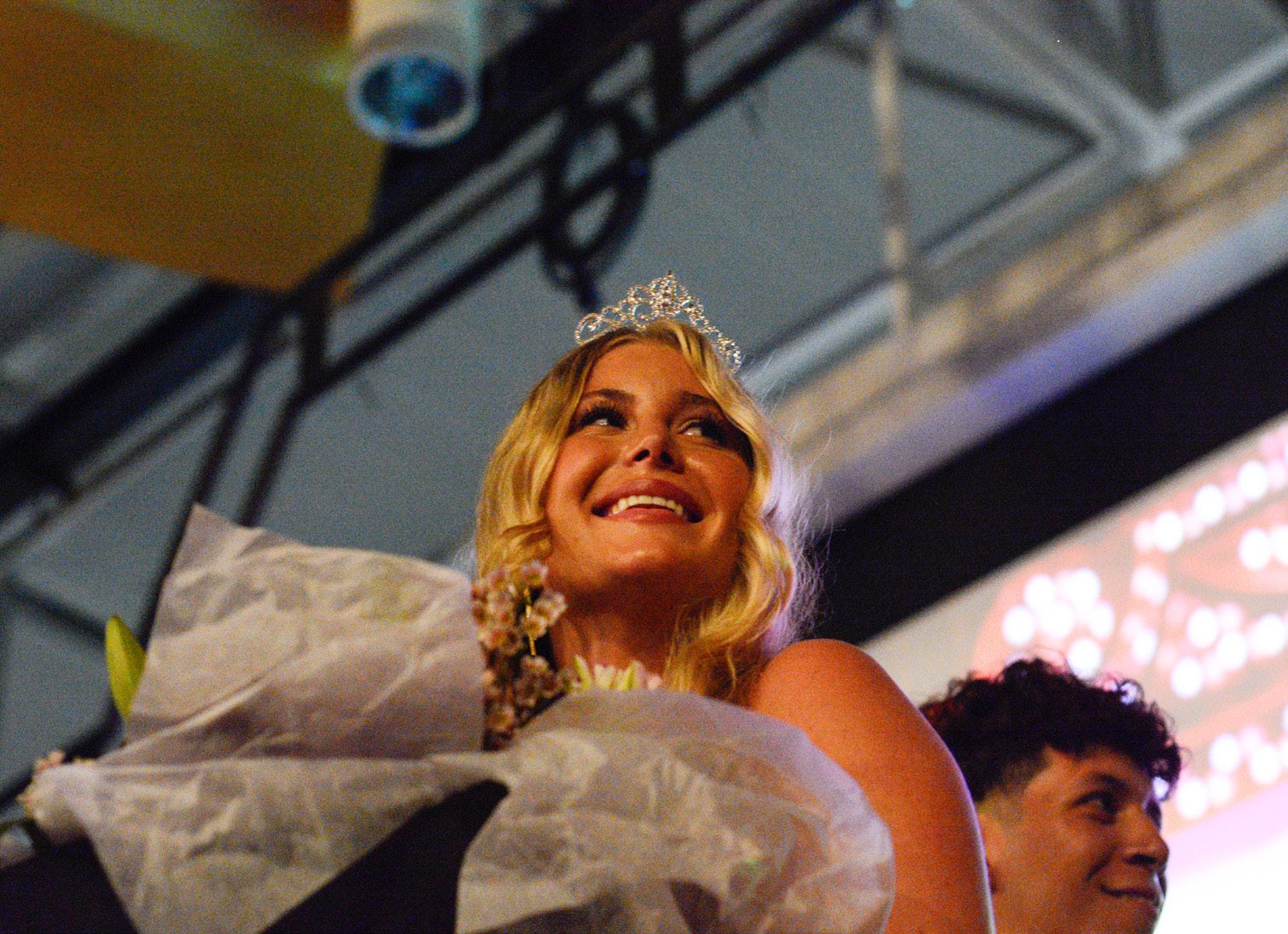
5. Senior Rachel Treadway talks with junior Colby Lovins
6. A group of students dances to the music
7. Senior Keller Douglas joins the conga line
5 6 7
page by Alex Osburn
4
INDIANA EXPERIENCES WEATHER CHANGES FIRSTHAND
by Alice Pisoni design by Novah Ulm
Climate change has been more prevalent in recent years, especially in the U.S., full of different geography zones and environments, and, consequently, more exposed to environmental changes because of their emissions.
According to the United Nations, the main cause of climate change so far has been humans. For two centuries man has been affecting the Earth by burning fossil fuels, such as coal, oil, gas and increasing day by day the emissions that these activities create. Burning these non-renewable resources contributes to creating the greenhouse effect, which surrounds the Earth and traps the sun’s heat, causing temperatures to rise inside of the atmosphere.
The results of these actions are evident all over the country. From the wildfires on the West Coast to more frequent hurricanes on the East Coast; from warm winters in the Midwest to snowfalls occurring less and less and out of the winter season.
Earth.org explains that the fire season in the U.S. was four months on average and has now doubled due to environmental changes. During 2020, the U.S. had one of the biggest fires in history, which lasted for over a year and destroyed parts of California, Oregon and Washington.
According to the Center for Climate and Energy Solutions, environmental changes have also affected the severity of hurricanes and tornadoes, as these natural disasters have increased in intensity and decreased in their speed of travel. The Midwest has always been a target for tornadoes and strong winds.
These severe wind storms and tornadoes have affected the people of the Midwest, including government teacher Jerry Mihay.
“I was not home at the time and when I got home I was in disbelief,” Mihay said.
The storm that hit Columbus affected Mihay’s surrounding areas.
“The wind went by my house and knocked down 200 feet of my fence and two trees,” Mihay said. “I was fortunate that it didn’t hit my house, but it did a lot of damage.”
Not only did Mihay have physical damage to his property, but the storm also affected him and his family in other ways.

“It cost us a lot of money,” Mihay said. “People don’t understand that insurance is very particular about what they are going to pay for and we did not receive much money for our fence. The entire fence had to be replaced, 520 feet, but because of its age they didn’t give us much money on that. It also costs money to get the trees removed.”
Other community members experienced aftereffects too, causing vital companies to be backed up.
“We lost our privacy for probably
about four months because the fence company didn’t replace all the fences,” Mihay said. “They were booked up because of that storm.”

Mihay believes that climate change is a factor in these sorts of weather events..
“I believe that there is some sort of climate change occurring,” Mihay said. “Now, the source of that change is really the debatable part. Mankind has altered it, that’s the part up for debate.”
Mihay understands the impacts of climate change and weather damage, but sees the positives in the situation.
“We thought about everything that happened and we were just thankful that it didn’t damage our house and the rest,” Mihay said. “It wasn’t any fun to have it, but it could have been worse.”
Mihay expressed his understanding for those affected in the recent storm in Whiteland.
“I had a lot of empathy for those people, and they had much much worse than I did,” Mihay said.
5
Staff describe their experience with the effects of climate change
BREAKING THE CYCLE
It’s more beneficial to prioritize people over product
Abright phone screen illuminates the darkness of the room. After a busy day, notifications are scrolled through and an abundance of notifications come from the popular social media app, Instagram. When the app is opened and the feed of photos and videos load, it only takes a few minutes for the first advertisement to appear on the screen. Seeing fashionable clothes for a low price captures the attention of people aimlessly scrolling. However, what people fail to take into consideration is who or what proceeds to suffer in order for these clothes to be produced and sold to the world.
Eighty percent of the Triangle staff believes Americans over-consume clothes, and according to Statista, the U.S. generates the most revenue from apparel out of any country. However, overproduction and overconsumption in the garment industry is not only limited to the United States. Worldwide, the environmental impacts of excessive clothing production and consumption far outweigh the fleeting
“trendy” feel of fast fashion.
Companies minimize production costs to maximize profits, often choosing to use fossil-fuel based materials such as polyester or nylon. These cheaply manufactured textiles not only allocate significant quantities of nonrenewable resources to making clothing that will ultimately wear out faster, but also release massive amounts of carbon dioxide into the atmosphere during all stages of the process. In fact, a study by global management company McKinsey found the global fashion industry produced roughly 2.1 billion tonnes of carbon dioxide in 2018 alone. The environment faces all these repercussions in exchange for garments that are sometimes worn only seven to 10 times before being discarded.
Along with the negative impacts on the natural world, the profit-over-people mindset of the fast fashion industry is detrimental to society at large. The culture of fast fashion encourages consumers to buy whatever the newest style is, regardless of if they actually need that extra hoodie
or that new pair of shoes. This mindset perpetuates a cycle of higher demand without the new garments actually ever being worn.
Additionally, the companies producing such garments often employ unethical practices, whether that be in material sourcing or employee treatment. Such practices are motivated by the desire to increase production rates, even if it costs human lives. In 2013, the Rana Plaza factory disaster resulted in the death of 1,134 people. Despite knowledge of the building being unsafe, workers were still told to go and put under risk due to owners prioritizing production over lives.
Despite the overwhelming negative impacts fast fashion has on the world, there are actions society can take to limit the effects. Extending the life of existing clothing instead of continuing to buy an excess amount of new clothes is a necessary step toward a cleaner planet. It is also necessary to hold companies accountable so consumers can make informed choices about their purchases.
FAST FASHION FACTS
Clothing sales have DOUBLED since 2000 2X Clothing utilization has GONE DOWN since 2000
fashion produces
source earth.org
Fast
HALF A MILLION tons of microplastics
More than $500 BILLION are lost each year because of clothing usage habits
LIFE IN PLASTIC IS FANTASTIC
Everyone’s childhood dream come true: a real-life Barbie movie
According to the Warner Bros, “to live in Barbie Land is to be a perfect being in a perfect place.” The upcoming 2023 live-action Barbie movie has stirred up a lot of discussion and controversy. The film, in which Margot Robbie will play the lead role, promises to be a grand recreation of the tale of the famous doll. Fans are thrilled to see their childhood favorite brought to life on the big screen.
Many contend that the upcoming film has the power to depart from the stereotypes led by the Barbie brand and send a positive message to young audience members. The storyline even suggests that we will no longer see Barbie in a perfect light. Greta Gerwig, the film’s director, is renowned for being quite the feminist and
has made no secret of her goal to make a Barbie movie that captures the complexity of womanhood. The movie might have a wider variety of body sizes, skin tones and gender expressions, which could significantly challenge the Barbie brand’s standards.
In terms of female-led franchises, the Barbie movie has the potential to pioneer new territory. Warner Bros. will release the movie, which is made by Margot Robbie’s production firm, LuckyChap Entertainment. This is a rare instance of a female-led production team tackling a big-budget movie, which might aid in removing obstacles for women in the film industry. Overall, there is a lot of anticipation surrounding the real-life Barbie movie, which has led to many unclear feelings. While it is uncertain whether the
by Meghana Penmathsa
movie will challenge negative stereotypes or support them, it is obvious that it has the power to significantly alter how the younger generation views gender, attractiveness and representation in our media.


A FAREWELL TO GUNN AND THE GUARDIANS
A spoiler-free review of James Gunn’s final production for Marvel
It’s been nearly a decade since James Gunn’s “Guardians of the Galaxy,” and now the trilogy finally ends.
“Guardians of the Galaxy Vol. 3” delivered everything it promised and more. Once again, Gunn’s style fits the characters perfectly, and the movie feels like his final goodbye to the “Guardians” movies and Marvel.
In 2014, James Gunn entertained audiences with his unique brand of fun, lighthearted characters mixed with dark themes in a way that appealed to all audiences. Since then, Marvel has attempted to recreate this style by interjecting jokes and quippy one-liners into every movie, which sadly causes tonal clashes and makes the movie less enjoyable. Gunn
returns one last time to the big screen to show Marvel how it’s done. The movie has a consistent tone, the character’s actions are believable and the fun characters don’t interfere with the story Gunn wanted to tell. He once again allows the story to stand on its own, not requiring the audience to watch four different movies and three exclusive Disney+ TV shows to understand. I recommend watching the first two “Guardians” movies first, but one can still enjoy the movie without watching them.
The pacing in the first act is a bit rough, but after the conflict kicks into action it’s smooth. I could tell how much effort was put into the 2nd and 3rd act action scenes, they are unique and a breath of fresh air from
the rapid cuts of most Marvel movies. Without spoilers, my favorite fight scene in the movie was one continuous shot, utilizing different frame rates and panning between characters to show the impact of every action. Gunn fixing all of the most common criticisms with modern Marvel movies felt like him sticking it to Disney one last time before he takes over as the ultimate creative overseer for everything DC.
James Gunn moving on to lead DC gives me great hope for the future. He’s rebooting the entirety of DC and starting fresh. Marvel has gotten complacent in their dominance of the box office, leading to lower-quality movies that they know audiences will pay money to see regardless of the quality.
by Aidan Brown
James Gunn whipping DC into shape will give Marvel a run for its money, forcing it to clean up its franchise or risk being left behind by Gunn’s DC. The first DC movie that will be one hundred percent under Gunn’s creative vision will be “Superman: Legacy” coming in 2025.
7
EXCHANGE EXPERIENCE
Exchange students and hosts reflect on their experiences throught the year


 by Ajay Singireddy design by Jocelyn Aguilar
by Ajay Singireddy design by Jocelyn Aguilar
Q + A with Exchange Students
What made you decide to participate in the exchange program?
Honestly, I decided to participate because I wanted to try, see how far I can get, and figured I couldn’t lose anything by trying. Of course, living in the United States and going to an American High School is a dream a healthy amount of Germans had in their life.
What were some expectations you had for the program?

I knew that it is something special that is most definitely a rare thing to be able to experience. I also expected to get homesick very soon. Interestingly enough, it never really happened. I was expecting to miss everything from my life I was used to, but I can say that I was able to adjust to the new circumstances without many problems.
We have 13 years of school [in Germany], so the junior year you don’t really do a lot. You just select classes and all that, but nothing important for your graduation so it’s basically like an orientation year. It’s why I thought I would do this.
Q + A with Host Students
How do you think being a host to a exchange student has impacted you?
I would definitely recommend hosting for other students if they're up for it. This is because I feel that it is important to open your horizons as much as you can, and you're contributing toward an exciting trip for someone else.
I didn’t really have expectations, because everything is different. It’s why I didn’t try to set any expectations — to not be sad about it if it didn’t come true.
Would you recommend hosting to other students?
I think hosting is a really good experience. It was just really nice to have her over, and we could just hang out in the living room together, and go out for bowling with other people and we just hang out and have a good time.
I think being a host to a foreign exchange student has impacted me positively by seeing the average everyday things we find normal as Americans through the lens of someone not from the country. It’s a different kind of feeling when looking through your normal and familiar world through someone else’s point of view.
I would definitely recommend hosting for other students if they're up for it. This is because I feel that it is important to open your horizons as much as you can, and you're contributing toward an exciting trip for someone else.
Marcella Brunner
Maximillian Grewe
Johann Peters
Lukas Hoehn
FUN IN THE SUN
How students plan to spend their summer vacation by Ben Psota design by Irvin Castaneda
As the school year comes to a close the excitement for summer begins to boil. The final stretch is here and summer break is just around the corner, but many students have already planned out what they might do over this break.
Junior Kenzie Pendelton has her plans set out and is excited about many upcoming vacations this summer.
“I’m most excited to have more time to hang out with friends, get more sleep, summer practices and some fun trips,”
Pendelton said. “I’m planning on going on a trip to Kirtland with my youth group, Colorado for a family reunion and Utah for a cross country camp and college visits.” Although it’s called summer vacation, there are still many other things to do when traveling isn’t on the radar. Sophomore Konnor Gribbins shares what he likes to do in his spare time while on break.
“When I am not on the beach, some of my favorite summer activities are fishing, playing soccer, bird photography, biking and herping, which is finding, observing
and catching reptiles and amphibians,” Gribbins said.
No matter how fun the activities people do over the summer may be, spending time with loved ones is another common practice. Freshman Logan Vanzant shares who he enjoys spending time with the most over the summer.

“I enjoy hanging out with my friends a lot over the summer,” Vanzant said. “I’m probably most excited for team camp for cross country because it’s really fun [and] really hard, and I get to spend a lot of time with my teammates.”
21% said unsure

16% said no
63% said yes
9
SUMMER PLANS? source @CNHSmedia Instagram poll
It pays to advertise with The Triangle! Contact CNHS Media for more information advertising@cnhsmedia.com
photo by Grace Wheatley
FIELD FACELIFT
by Ben Psota design by Aidan Brown photo by Novah Ulm
How the new renovations to the softball field are affecting players
Q+A with Morgan Jarvis
What improvements have been made?
“New lights have been added to the field. Now that our field has lights we can actually finish the whole game without the worry that our game will be stopped.”
How does this help your season?
“As a player, it gives me more energy knowing we can finish the whole game without worrying about it being canceled.”
How does it affect the team?
“It affects the whole team because the atmosphere changes when the lights get turned on. It’s a new level of energy we gain.”
BASEBALL SOFTBALL

Ball Bases Bat Length 9 inch circumference; 5 ounces 12 inch circumference; 7 ounces 42 inches long, wooden 60.5 feet away; overhand throw 46 feet away; underhand throw 90 feet apart 60 feet apart 9 innings 7 innings Pitcher
34 inches long, metal
Freshman Morgan Jarvis up to bat against Terre Haute at the freshly renovated field
THE MUSIC NEVER RESTS
Leaders and members of Columbus marching band anticipate the upcoming season
by Alex Osburn design by Ram Gowda
One hundred ninety people. Eleven sections. Three movements. One hundred days from the first practice to the first halftime performance. From rising seniors who have years of experience to incoming freshmen with no prior marching experience, all skill levels and abilities are represented within the Sound and Spirit of Columbus marching band at the start of the season.
To make this feat possible, the band organizes a camp during the last two weeks of summer break to get a jump-start on putting together its show. Band director Keith Burton emphasizes the importance of putting in this extra time.

“During the camps we have basically a week’s equivalent of rehearsal time in one day,” Burton said. “So we are building skills at a rapid level during camp, and it really gets everything kind of set up so we can learn faster as we go and continue to get better because we don’t have as much rehearsal time when school starts.”
From a student perspective, the additional practice has benefits as well. Junior Conner Hoffman appreciates the improvement he sees from band camp.
“I feel like without [summer band camp] we wouldn’t be anywhere near as good as we are,” Hoffman said. “I think a lot of our success comes from that just because we have those two weeks to kind of bring everyone together before we just have after-school rehearsals.”
The camp isn’t just meant to develop musical skill, however. Along with improving the technical aspects of performance and musicianship, Burton explains how the band aspires to create a community atmosphere as well.
“We want to have a group that is a welcoming and positive environment for everybody, [where] everybody that wants to be in band has a place, and so we work hard to create that culture where that’s possible,” Burton said.
One way to build this welcoming environment is through having student leaders
take over some responsibilities within the band. Sophomore Kylee Dieter will be a drum major next season, and she looks forward to forming relationships with other band members.
“[My role] entails leading the band and being someone that the band members can trust,” Dieter said. “I hope that I’m able to make an impact for the band members, and that I’ll be able to improve my leadership skills and who I am overall as a person.”
Similarly, Hoffman hopes to reinforce a sense of belonging for other members through his role as section leader in the upcoming season.
“I had juniors and seniors when I was a freshman that taught me how to march and really showed me why everybody loves band,” Hoffman said. “They showed me why I should love band, and I want to do that for other people.”
11
A DAY IN THE LIFE A glimpse into the schedule of band camp week two 9 am Drill and marching basics 1 pm Music 5 pm Dinner in the cafeteria 12 pm Lunch in the cafeteria 3:30 pm Downtime 6 pm Combining music with drill
THE CYCLE
What goes around comes around
by Izzy Munn, Sylvia Sasse, Deshna Venkatachalam, Lydia Weed

Reduce. Reuse. Recycle. According to the Environmental Protection Agency (EPA), an organization that protects people and the environment from risks that come from pollution, around 75% of the American waste stream is recyclable, while only 30% of it is recycled. While there are many ways to reduce, reuse and recycle unwanted or unused materials, the American population does not normally take advantage of it. However, according to the Indiana Department of Environmental Management, the state’s recycling rate has increased by 2% from 2020 to 2021. Sophomore Roma Siriram discusses what the Environmental Club does to contribute to this increase.
“Every Friday, after school, we collect all of the trash bags and things that are put in the recycling bins in classrooms,” Siriram said. “We sort through and make sure there’s not trash. If there is, then we dispose of that properly, and then we give all the stuff that should be recycled to the city.”
A list of items that can be recycled can be found on IN.gov. Plastics with numbers one through seven, glass, cardboard and paper are a few of the items listed. Siriram discusses how disposing of these items makes a difference in the community.
“You can see the impact that you’re making on a city scale. Not just recycling but reusing and reducing as well,” Siriram said. “You can see that tangible goal.”
According to the EPA, the United States is “one of the largest generators of municipal solid waste per person on a daily basis,” or in shorter terms, the United States generates the largest amount of garbage and waste per person daily. Waste production is influenced by an area’s consumption, economic activity and population. Waste management, even at a small scale, impacts the environment in a positive way.
“I think more people should definitely recycle. Not just recycling but definitely reusing and reducing as well,” Siriram said. “I also think that if school’s implement a better recycling system it would develop good habits for everyone.”
Waste management can be implemented in many different ways. Many school supplies can be recycled such as paper, cardboard and pencils. With a general policy of recycling being implemented
within a school district, waste can be reduced drastically. Reducing, reusing and recycling are all important factors in waste reduction and management. With waste reduction comes positive impacts on the environment. For example, according to the Environmental Defense Fund, an organization that focuses on finding solutions to environmental issues, when there are copious amounts of waste being burned, toxic chemicals such as nitrogen oxides are also being sent into the air. The reduction of waste means less production of these chemicals, thus saving energy. Other positive effects of recycling include saving money and overall helping to sustain the environment.
Similar to recycling, upcycling is another way of reusing items in order to prevent them from going to waste. Upcycling consists of transforming unwanted or useless products into new ones with artistic or environmental value.
Currently, only about 21% of Americans upcycle, and 13% remain uninterested in the cause as a whole, according to The Ocean Blue Project, a nonprofit ocean cleanup group. While 21% is a start, a large number of Americans are still allowing for reusable products to be thrown into landfills, causing an irreversible negative impact on the environment.
Senior Paige Rice is a part of the 21% of Americans who participate in upcycling. Starting her freshman year of high school, Rice began her ecological adventure of working reusable products into her artwork.
“As an artist, I use lots of frames within my work,” Rice said. “Within those frames I preserve butterflies and dried flowers, and afterwards I will sell that art or keep some for myself. Most people when they hear ‘upcycling’ they think of clothing, but there is so much more you can do than that. You just have to put your mind to it.”
While being a benefit to the environment, upcycling can also be a benefit money-wise.
“[Upcycling] is a lot cheaper than having to buy everything straight out of the store,” Rice said. “Think about getting a table from Goodwill then paying $15 worth of stain to paint it versus going to Ikea and buying a brand new $300 one. You’re getting the same thing but spending hundreds of dollars more. One takes $30 and an hour worth of work and is clearly the much cheaper option.”
13
“Most people when they hear ‘upcycling’ they think of clothing, but there is so much more you can do than that. You just have to put your mind to it.” senior Paige Rice
“You can see the impact that you’re making on a city scale. Not just recycling but reusing and reducing as well... You can see that tangible goal.”
sophomore
Roma Siriram
Even if the act of creating or building new items isn’t for everyone, there are still other ways to help upcycle.

“It definitely is important to upcycle, reuse things and update items, but you can also recycle or use renewable products,” Rice said. “When you make purchases, you can shop smart and choose eco-friendly items. Items that come from sustainable production methods can really help our environment, and can be used for a long time.”
Like Rice, junior Mia McClellan also began her upcycling experience during her freshman year, while living through COVID-19.
“For a while, during the pandemic, obviously a lot of people were ordering things online, so I had a lot of cardboard boxes at my house,” McClellan said. “I would break apart those cardboard boxes and use them as canvases because I couldn’t afford real canvases to paint on, so I would paint on the back of the boxes in order to sell them,”
While seemingly a tough activity to pursue, upcycling doesn’t have much to it.
“The only skill you need to be an expert upcycler is creativity,” McClellan said. “You have to be able to formulate in your mind what you want to build while also having an effective strategy to make all the pieces fit together, literally and metaphorically, rather than waste them.”
Similar to upcycling, thrifting and reusing clothing is another way to improve the environment. Examining one’s clothing consumption habits is essential in reducing, reusing and recycling. Brick-and-mortar stores such as Goodwill and Plato’s Closet give people an opportunity to give their clothes a new life and save on something “new.”
Depop, ThredUp, Curtsy, Poshmark and Mercari are online platforms that have popped up over the years, expanding the resale business and creating eco-friendly e-commerce. The ThredUp website states that the global secondhand market will reach $350 billion by 2027.
On an early Saturday morning, freshmen Johnathan Moguel Vidales and Jaziel Orduna can be found at the Goodwill Outlet in Greenwood, Ind. It is filled with bins of unsorted merchandise, which is paid for by the pound. This merchandise is typically what does not make it to the actual Goodwill store, and will soon be
clothes as well as some of their secondhand finds. Their account, @snail_retail, posts all apparel under $20. Depop currently has over 30 million items for sale with around 30 million users, according to their website.
Orduna has been successful so far, and plans to resell a few pairs of his shoes soon.
“There is a pair of Converse we’re going to put up, and Jordan One lows,” Orduna said. “I also put up a couple pairs of my jeans, and they sold pretty quick.”
According to Depop’s website, the most popular styles include: vintage, street wear, one-of-a-kind and Y2K. Moguel Vidales is a fan of today’s vintage trends in clothing, and speaks on his favorite item that he has thrifted.
“[My favorite item is] probably these vintage Wrangler cargos,” Moguel Vidales said. “They’re super baggy, they’re beautiful.”
According to BBC, buying a previously worn garment and wearing it for nine more months can eliminate its environmental impact once it gets discarded by 20 to 30%. Senior Madysin Perry is an employee at Goodwill, and thrifts about once every two weeks. She examines the benefits of thrifting.
“[Thrifting] is good for the earth because of how much it reduces waste, and many thrift stores like Goodwill support a good cause,” Perry said. The economical benefits of thrifting are a major plus in addition to the benefits of reusing.
transported to be recycled.
“I go [to the Goodwill Outlet] once a week,” Moguel Vidales said. “I also go to Sans Souci, which is located near the school. They have cheap clothes.”
The students have collaborated to make a Depop account where they sell their old
“[My favorite items are] my lululemon items, which are very expensive new, and I’ve found some new with tag items for five dollars,” Perry said. Trying to lessen one’s environmental footprint can be achieved by reducing, reusing and recycling, but putting them into practice takes effort. Participating in a local recycling effort, upcycling and
A handmade art piece from upcycled materials by senior Paige Rice
being conscious of clothing consumption all contribute to this.
“At the end of the day we’re just two boys selling our clothes,” Moguel Vidales said. “We’re making money and reducing all the clothes that are in the wastelands.” said. “When you make purchases, you can shop smart and choose eco-friendly items. Items that come from sustainable production methods can really help our environment, and can be used for a long time.”
Like Rice, junior Mia McClellan also began her upcycling experience during her freshman year, while living through Covid-19.
“For a while, during the pandemic, obviously a lot of people were ordering things online, so I had a lot of cardboard boxes at my house,” McClellan said. “I would break apart those cardboard boxes and use them as canvases because I couldn’t afford real canvases to paint on, so I would paint on the back of the boxes in order to sell them,”
While seemingly a tough activity to pursue, there isn’t as much to upcycling as most people think.
“The only skill you need to be an expert upcycler is creativity,” McClellan said. “You
have to be able to formulate in your mind what you want to build while also having an effective strategy to make all the pieces fit together, literally and metaphorically, rather than waste them.”
Examining one’s clothing consumption habits are essential in reducing, reusing and recycling. Brick and mortar stores such as Goodwill and Plato’s Closet give people an opportunity to give their clothes a new life and save on something “new.” Depop, ThredUp, Curtsy, Poshmark and Mercari are online platforms that have popped up over the years, expanding the resale business and creating eco-friendly e-commerce.
On an early Saturday morning, freshman Johnathan Moguel Vidales and Jaziel Orduna can be found at the Goodwill Outlet in Greenwood, Indiana. It is filled with bins of unsorted merchandise and you pay by the pound. This merchandise is typically what does not make it to the actual Goodwill store, and will soon be transported to be recycled.

“I go once a week,” Moguel Vidales said. “I also go to Sans Souci, which is located near the school. They have cheap clothes.”
The students have collaborated to make a Depop and Instagram account where they
sell some of their secondhand finds as well as their own clothes. Their account, @snail_ retail, posts all apparel under $20. Depop currently has over 30 million items for sale with around 30 million users, according to their website. Orduna plans to resell a few pairs of his own shoes.


“There is a pair of converse we’re going to put up, and Jordan One lows,” Orduna said. “I also put up a couple pairs of my jeans, and they sold pretty quick.”
According to Depop’s website, the most popular styles include vintage, streetwear, one-of-a-kind and Y2K. Moguel Vidales is a fan of today’s vintage trends in clothing. He talks about his favorite item that he has thrifted.
“[My favorite item is] probably these vintage Wrangler cargos,” Moguel Vidales said. “They’re super baggy, they’re beautiful.”
Senior Madysin Perry has worked at Goodwill since the beginning of the school year.
“[Thrifting] is good for the earth because of how much it reduces waste and many thrift stores like Goodwill support a good cause,” Perry said.
15
photo by Alice Pisoni
PIECE OF PIE

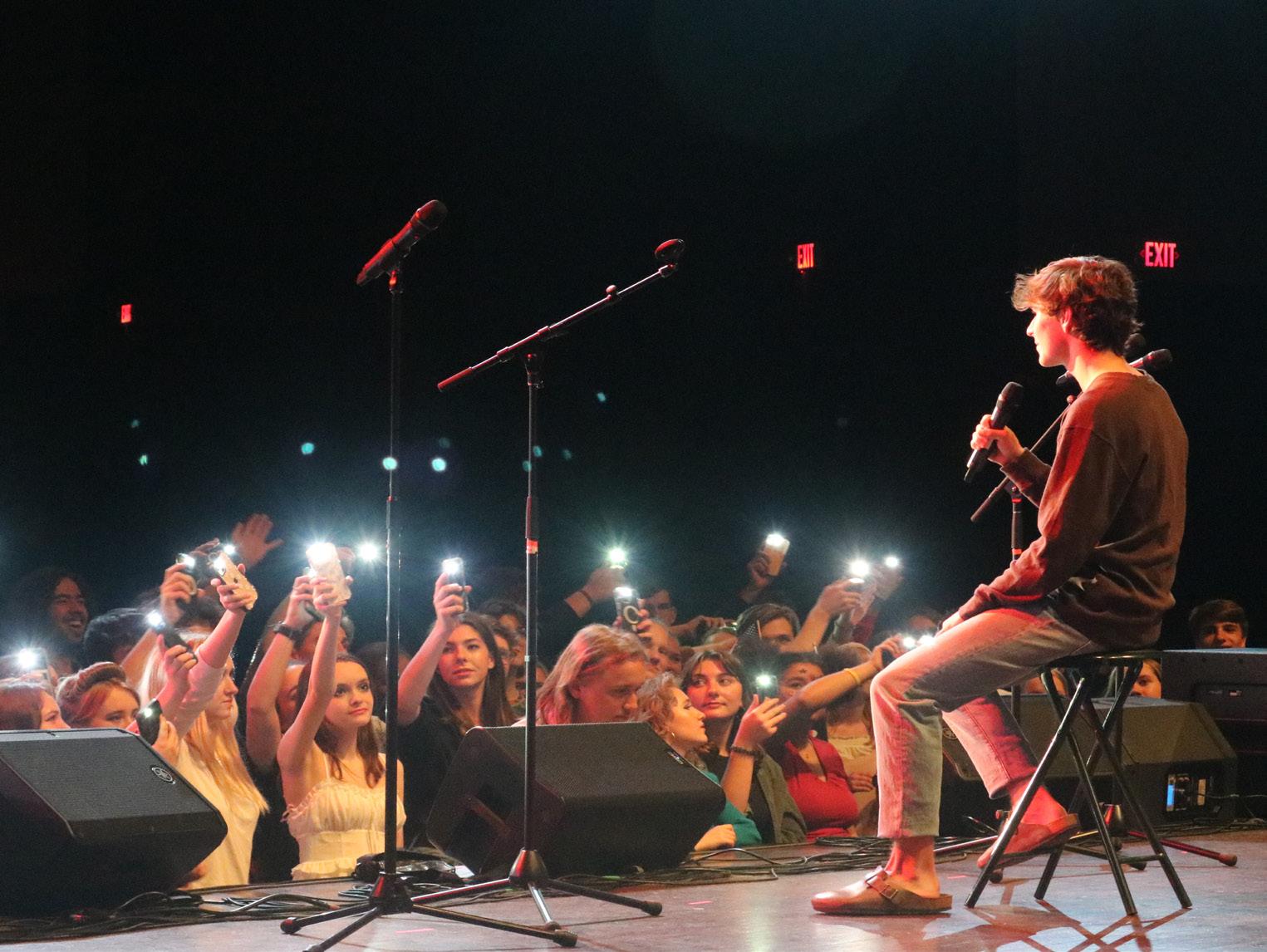
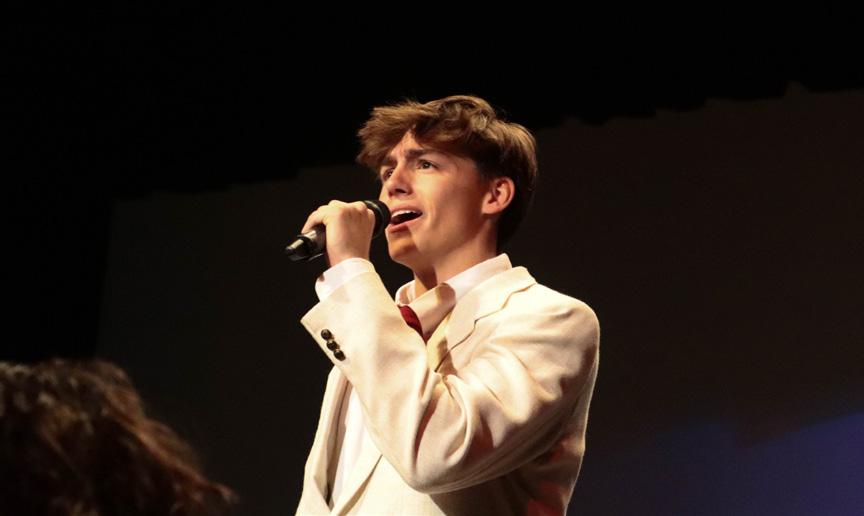
1 2 3

4 5 6

 Students and staff perform at American Pie 2023 design by Jasmine Yang photos by Sylvia Sasse and Grace Wheatley
1. Junior Amelia Maddox sings “Call Me” by Blondie
2. Junior Fisher Mantooth serenades the crowd with James Taylor’s “Fire and Rain”
3. Social Studies teacher Jerry Mihay plays the guitar
4. Junior Frankie Polyak sings “If I Can Dream” by Elvis Presley
5. Junior Colby Lovins performs “Can’t Take My Eyes Off of You” by Frankie Valli
6. Sophomore Kate London dances while performing “Venus” by Shocking Blue
Students and staff perform at American Pie 2023 design by Jasmine Yang photos by Sylvia Sasse and Grace Wheatley
1. Junior Amelia Maddox sings “Call Me” by Blondie
2. Junior Fisher Mantooth serenades the crowd with James Taylor’s “Fire and Rain”
3. Social Studies teacher Jerry Mihay plays the guitar
4. Junior Frankie Polyak sings “If I Can Dream” by Elvis Presley
5. Junior Colby Lovins performs “Can’t Take My Eyes Off of You” by Frankie Valli
6. Sophomore Kate London dances while performing “Venus” by Shocking Blue





















 by Ajay Singireddy design by Jocelyn Aguilar
by Ajay Singireddy design by Jocelyn Aguilar















 Students and staff perform at American Pie 2023 design by Jasmine Yang photos by Sylvia Sasse and Grace Wheatley
1. Junior Amelia Maddox sings “Call Me” by Blondie
2. Junior Fisher Mantooth serenades the crowd with James Taylor’s “Fire and Rain”
3. Social Studies teacher Jerry Mihay plays the guitar
4. Junior Frankie Polyak sings “If I Can Dream” by Elvis Presley
5. Junior Colby Lovins performs “Can’t Take My Eyes Off of You” by Frankie Valli
6. Sophomore Kate London dances while performing “Venus” by Shocking Blue
Students and staff perform at American Pie 2023 design by Jasmine Yang photos by Sylvia Sasse and Grace Wheatley
1. Junior Amelia Maddox sings “Call Me” by Blondie
2. Junior Fisher Mantooth serenades the crowd with James Taylor’s “Fire and Rain”
3. Social Studies teacher Jerry Mihay plays the guitar
4. Junior Frankie Polyak sings “If I Can Dream” by Elvis Presley
5. Junior Colby Lovins performs “Can’t Take My Eyes Off of You” by Frankie Valli
6. Sophomore Kate London dances while performing “Venus” by Shocking Blue
